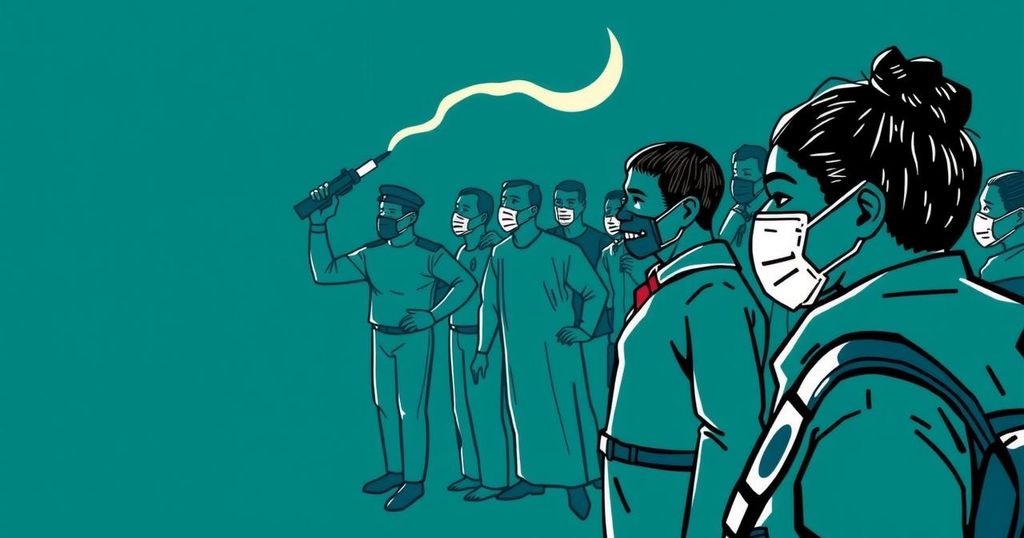Human rights groups express alarm over the Azerbaijani government’s crackdown on environmental activists during COP29. Allegations of political repression have emerged, indicating that the environment for civil society in Azerbaijan has deteriorated since its selection as host. Critics emphasize the need for global leaders to prioritize human rights in climate action discussions, urging a reassessment of the criteria for selecting host countries for major climate conferences.
Human rights groups have raised serious concerns regarding the Azerbaijani government’s treatment of environmental activists during COP29. There are accusations that the government is suppressing protests and dissent, particularly against those voicing criticism. The Climate Action Network, representing nearly 2,000 organizations, emphasized that a supportive civil society is essential to achieving climate goals. In response, the Azerbaijani government has denied these claims, asserting that it does not detain political prisoners and promoting its role as a host for the climate summit. The situation in Azerbaijan has reportedly worsened since it was chosen to host COP29, with significant increases in arrests of political opponents, journalists, and environmental activists. Amnesty International’s Natalia Nozadze highlighted that dissenters are facing greater risks under the government, which has arrested more than 300 individuals, a notable increase in political prisoners since the early 2000s. Additionally, Gubad Ibadoglu, an academic and environmental expert, expressed concerns about the undue charges against him, indicating a concerted effort by the government to stifle influential voices. Observers have noted that both local activists and international entities are being repressed. Cases such as Anar Mammadli’s arrest, which occurred shortly after he co-founded an organization advocating for the Paris Agreement, illustrate the increasing perils faced by environmental advocates in Azerbaijan. Moreover, the government’s expansion of fossil fuel production contradicts the actions necessary to combat climate change, raising alarms about their sincerity in addressing these issues during COP29. While the UN has included provisions for human rights protection within this year’s Host Country Agreement, activists argue that enforcement remains a challenge. Tasneem Essop of the Climate Action Network and Andreas Sieber from 350.org called for more decisive actions from the international community to ensure host countries maintain respect for human rights. Critics assert that countries such as Azerbaijan, which have a history of human rights violations, should not be permitted to host significant global conferences. In light of these developments, the international community is urged to reassess its approach toward host country designations for such summits to ensure the protection of civil society and the promotion of civil liberties as integral components of climate action efforts. Current tensions highlight a critical need for global leaders to prioritize human rights alongside environmental sustainability initiatives, a sentiment echoed by numerous organizations and activists dedicated to climate justice.
The article discusses the implications of hosting the COP29 climate summit in Azerbaijan, where human rights abuses have reportedly intensified during this period. Environmental activists and political opponents have faced arrests and repression, raising alarms from numerous human rights organizations. The concerns are not unique to Azerbaijan; previous summit hosts like the UAE and Egypt faced similar criticisms regarding their treatment of civil society. This ongoing issue underscores the necessity of ensuring that human rights are upheld in parallel with climate commitments, presenting a challenge for global governance in climate negotiations.
In conclusion, the ongoing suppression of civil society in Azerbaijan amid COP29 has prompted outcry from human rights organizations and highlights the intersection of climate action and human rights. With activists facing increased danger and political prisoners on the rise, the urgent call for a reassessment of host country criteria grows louder. The necessity for international accountability and the safeguarding of civil liberties is increasingly critical to fostering a meaningful and inclusive dialogue on climate issues.
Original Source: www.bbc.com






